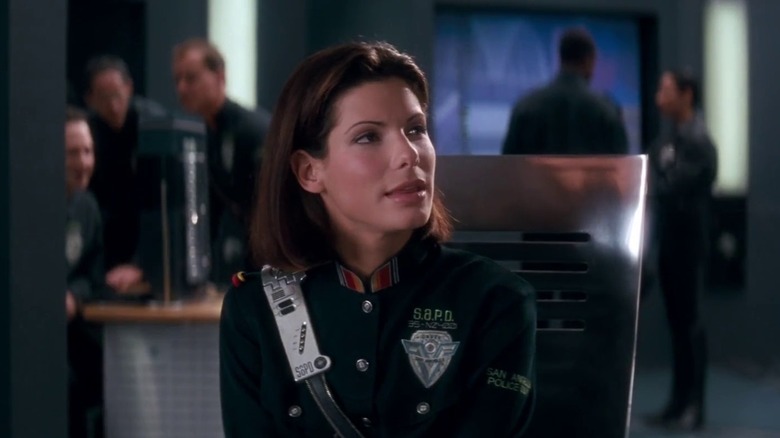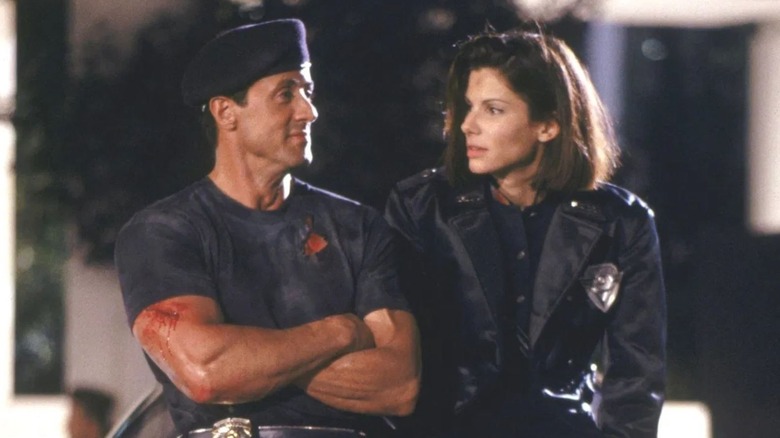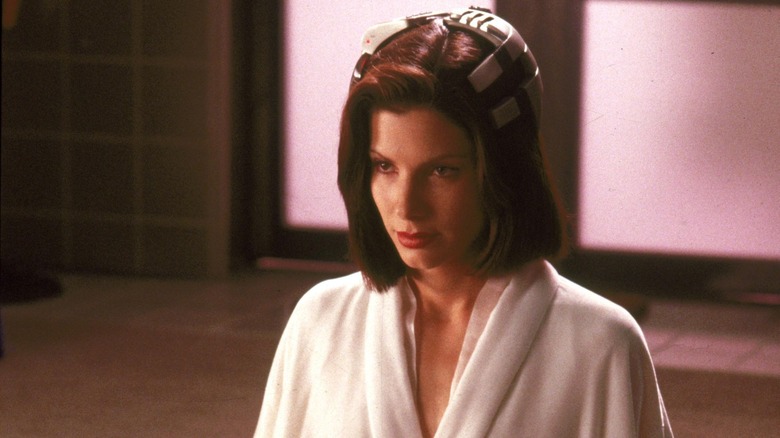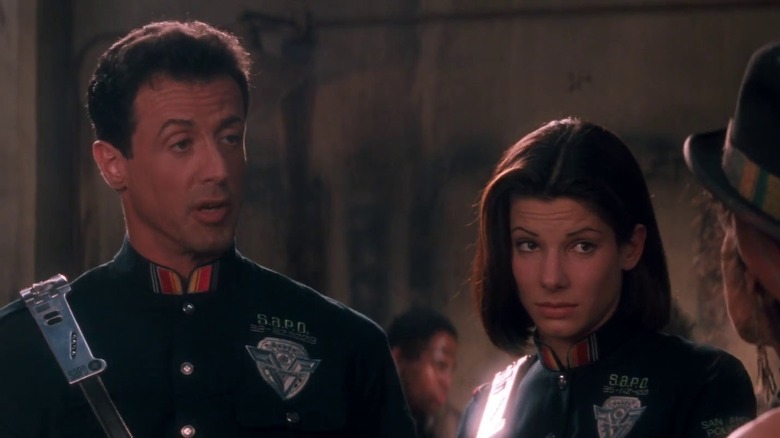The Sandra Bullock Sci-Fi Love Scene We're Still Thinking About
Director Marco Brambilla has spent most of his career involved in ambitious artistic video installation projects, often mixing recognizable pieces of pop media into abstract and self-aware metanarratives that invite the viewer to reconsider the way said media is consumed and perceived. Brambilla has made an installation named after Michael Cimino's "Heaven's Gate," made a supercut of cinematic war scenes called "Evolution" in 2010, and was one of the filmmakers featured in the 2006 sex-themed anthology film "Destricted." Brambilla has spent his career delving into new media frontiers and was an early adopter of concepts like living online and moving into the metaverse.
It's curious, then, that Brambilla's feature film debut should be something as boldly commercial — and as slickly exciting — as the 1993 sci-fi actioner "Demolition Man" starring Sylvester Stallone, Wesley Snipes, and Sandra Bullock. "Demolition Man" was a high-profile, big-budget studio tentpole that opened at #1 at the box office and made over $159 million worldwide. It was a notable film for its stars, showcasing Stallone's and Snipes' penchants for action, and offering blockbuster visibility for Bullock, still on the rise in 1993.
"Demolition Man" took place in a future where crime had been brought to an end, and society had evolved — or devolved — into a clean and ultra-polite semi-utopia wherein people no longer touched, everyone spoke in a concise and gentle fashion, and nearby machines would issue fines to anyone nearby who let slip a cuss word. Toilet paper had been replaced by a mysterious device referred to as the "three seashells," and sex had been replaced by a strange VR helmet that could simulate touching without having to come into actual contact.
In a notable scene, Stallone and Bullock employ such helmets.
A little more on 'Demolition Man'
The premise of "Demolition Man" is excellent B-movie fodder. Stallone plays John Spartan, a cop in the near future of 1996 who has gained a reputation — and the film's titular nickname — for causing a great deal of collateral damage on his S.W.A.T.-like stings. In the film's opening operation, Spartan confronts his rival, Simon Phoenix (Snipes), who kills a group of hostages in response. Both of them are arrested and placed in a new state-of-the-art "Cryo-Penitentiary," wherein they will be frozen in blocks of ice and subliminally fed an in-brain mental rehabilitation program. Spartan wakes up in the year 2032 to find L.A. has become San Angeles that now functions as the above-described ultra-polite, touch- and cussing-averse society. Naturally, Simon Phoenix will also be thawed into this society unprepared for his brand of mayhem, requiring Spartan to apprehend him.
Bullock plays Lenina Huxley — named after author Aldous Huxley — a future cop who will serve as Spartan's liaison to the future. Huxley, a history buff fond of the 1990s, will provide the bulk of "Demolition Man's" exposition, explaining to Spartan that salt is illegal (because it's bad for you), the only remaining restaurant leftover from his time is Taco Bell (it was the last survivor of the great Franchise Wars), and that sex is now enjoyed safely and sanely without the pesky bother of undressing or touching.
Following a Taco Bell date, Huxley and Spartan fit computerized devices over their heads, close their eyes, and enjoy ... well, it might be sexual, but it's hard to tell.
The sex scene
The sex scene is awkward from the start. Huxley invites Spartan, in a very dry fashion, if he'd like to engage in intercourse. Spartan, a little taken aback, agrees. Huxley exits the room and reenters with the headpieces, and wearing a robe. They sit on chairs facing one another, Huxley's eyes closed, breathing heavily. Nothing sexual appears to be happening. When Spartan closes his eyes, he sees strobing lights, hears echoing noises, and catches a few fleeting glimpses of a nude body. He panics. Huxley assures him this is how sex looks now. A lot of physical activity is banned in 2032, and having sex the old-fashioned way is now considered "gross." Huxley and Spartan part ways.
The non-touching sex scene in "Demolition Man" speaks to its criticisms of a polite society run amok, pushed headlong into prudishness. Brambilla's comment seemed to be against a certain kind of political correctness that would eventually lead to a vital disconnect from what is real. These themes certainly play into Brambilla's larger body of work that explores the relationship humans have with media technology, and how human connections have slowly mutated into the virtual as a result of that relationship. Brambilla seems to be arguing that VR technology, despite being invented to facilitate communication, is actually eroding our ability to connect organically.
Brambilla's criticism is highlighted by additional scenes of a functioning underground in the world of "Demolition Man" where the impoverished long for meat, vice, and human connection. Comedian Denis Leary, best known in 1993 for his hit comedy album "No Cure for Cancer," has an energetic rant about how society has fallen apart and adherence to a strict code of polite conduct has robbed people of their ability to pursue their own happiness.
Satire of televangelists
It will also be revealed in "Demolition Man" that the future's media-savvy Messiah figure, a man named Raymond Cocteau (Nigel Hawthorne), has been manipulating public behavior for years as part of a larger criminal scheme. It won't take the viewer too long to realize that Cocteau may be up to something shady. Cocteau, depicted as a smiling, robed, liturgical figure, evokes a generation of sweaty, bigoted televangelists like Jerry Falwell and Jimmy Swaggart. Cocteau, with his placid-faced judgment, serves as a satire of the blunt moralizing of right-wing American TV churches. "Demolition Man's" future, possessed of an allergy to sexual touching, springs from a lot of rhetoric heard from televangelists and politicians of the time.
Huxley's sex helmets play like a humorous aside in the moment — the awkward scene between her and Spartan is played for laughs — and will lead to a character-building opportunity where the two cops will have to carry that discomforting moment with them moving forward. But the sex scene ultimately serves as a clever criticism of certain political and sexual attitudes prevalent in American media in 1993. A future wherein sex has been removed from human interactions is a dystopian detail ripe for dissection.
There's still a lot to think about.



